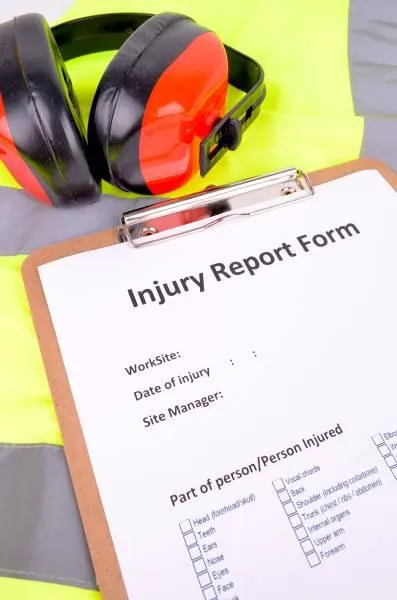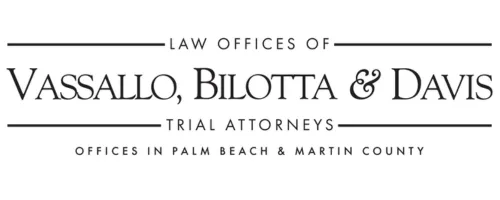WORKERS COMP BENEFITS GUIDE
Workers Comp Benefits Guide

This is a workers comp benefits guide for employees injured on the job in Florida, understanding your workers' comp benefits is crucial. This guide provides an overview of the benefits available to you and important steps to take after a workplace injury. Keep in mind that this is an overview of our complex workers comp system. The lawyers at Vassallo, Bilotta & Davis are here to answer all your questions and help you every step of they way. Our consultation is always Free and remember We Only Get Paid when You Do.
Overview of Workers’ Compensation Laws in Florida
1.Report Your Injury
Notify your employer as soon as possible after the injury occurs. In Florida, you have 30 days to report your injury to your employer, but it's best to do so immediately.
2.Seek Medical Treatment
Your employer is required to provide medical care for your work-related injury. Make sure to see a doctor approved by your employer or their workers' compensation insurance carrier.
3.File a Claim
Your employer should provide you with a workers' compensation claim form to fill out. Make sure to submit this form promptly to ensure that you receive benefits in a timely manner.
4.Temporary Disability Benefits
If you are unable to work due to your injury, you may be eligible for temporary disability benefits. These benefits can help cover a portion of your lost wages while you recover.
5.Permanent Disability Benefits
If your injury results in a permanent impairment, you may be entitled to permanent disability benefits. The amount of compensation you receive will depend on the extent of your disability.
6.Vocational Rehabilitation
If you are unable to return to your previous job due to your injury, you may be eligible for vocational rehabilitation services to help you transition to a new job or career.
7.Death Benefits
If a workplace injury results in death, the deceased worker's dependents may be eligible for death benefits, including funeral expenses and financial support for dependents.
8.Keep Records
Keep detailed records of all medical treatment, expenses, and communication with your employer and the workers' compensation insurance carrier. This documentation will be important in supporting your claim.
Navigating the workers' compensation system can be complex, but understanding your rights and benefits is essential to ensure you receive the support you need after a workplace injury in Florida. If you have any questions or need assistance with your claim, consider consulting with a workers' compensation attorney for guidance.
Reporting Your Injury
The first step after sustaining a work-related injury is to report it to your employer as soon as possible. Florida law requires you to report your injury within 30 days, but it's best to do so immediately. Your employer should then file a claim with their workers' compensation insurance carrier.
Medical Benefits covered under workers comp in Florida
Workers' compensation in Florida covers all authorized medically necessary care related to your work injury or illness, including:
- Doctor visits
- Hospital stays
- Physical therapy
- Prescription medications
- Diagnostic tests
- Medical equipment
If you are injured on the job, it's important to note that you must see a doctor authorized by your employer or their insurance company to receive these benefits. You cannot choose your own doctor, but you can request a second opinion,
If you go to your own doctor for a work-related injury or illness. Your employer is not obligated to extend you benefits in Florida if you don't follow the rules.

Wage Replacement and Disability Benefits
If your injury prevents you from working, you may be eligible for wage replacement benefits. These benefits typically begin on the eighth day of disability, unless your disability lasts for more than 21 days, in which case you'll be paid from the first day. There are four types of wage replacement benefits:
1. Temporary Total Disability (TTD)
2. Temporary Partial Disability (TPD)
3. Permanent Total Disability (PTD)
4. Impairment Benefits (IB)
The amount you receive depends on your average weekly wage and the extent of your disability. These are benefits you are entitled to, so do not be afraid to claim your comp benefits in Florida.
Additional Compensation and Benefits
Other types of benefits Florida workers' compensation may also provide:
1. Mileage Reimbursement: For travel to and from medical appointments.
2. Prescription Drug Coverage: You can fill prescriptions at any pharmacy, including mail-order services.
3. Home Modifications: If your injury requires modifications to your home, such as wheelchair ramps or enlarged doorways, these may be covered.
4. Home Health Care: Assistance with daily living activities if you're severely injured.
5. Vocational Rehabilitation: If you can't return to your previous job, you may receive training for a new occupation.
6. Death Benefits: If a worker is injured on the job and dies from his or her injuries, there may also be death benefits available to their surviving family.
Maximum Medical Improvement (MMI)
Your medical benefits will continue until you reach Maximum Medical Improvement (MMI), as determined by your authorized doctor. After reaching MMI, you may still receive necessary treatment, but you'll be required to pay a copay.
Dispute Resolution
If you disagree with a decision made about your claim, you have the right to appeal. The Florida Division of Workers' Compensation oversees the appeals process. We would highly recommend that you get an attorney for this process if you do not have one. The workers' comp laws in the state of Florida are complex and require a legal expert most of the time. There are many things you need to know about workers compensation and the average person does not have the time of skills to navigate this complex system.
Important Tips for Workers Injured on the Job.
1. Report your injury immediately to your employer.
2. Seek medical attention from an authorized provider.
3. Keep detailed records of all medical treatments and communications.
4. Follow your doctor's instructions carefully.
5. Attend all scheduled medical appointments.
6. Communicate regularly with your employer and the insurance company.
7. Consider consulting with a workers' compensation attorney if you face any issues with your claim.
Time Limits to File a Lawsuit for Workers Compensation
Be aware that there are time limits for filing a workers' compensation claim in Florida. Generally, you have two years from the date of injury to file a claim, but it's best to act promptly.
Third-Party Claims
In some cases, if a third party (not your employer) was responsible for your work-related injury, you may be able to file a separate personal injury claim in addition to your workers' compensation claim.
The Workers Comp Insurance Benefits in Florida is Not a Simple System, But it is the Only One that We Have
Navigating the workers' compensation system can be complex, especially when you're dealing with work related injuries and illnesses. If you encounter any difficulties or have questions about your benefits, don't hesitate to seek help. The Florida Division of Workers' Compensation provides resources and assistance, and in some cases, consulting with an experienced workers' compensation attorney may be beneficial. Our workers' compensation lawyers at Vassallo, Bilotta & Davis have been helping people injured at work receive compensation benefits they deserve for decades. Remember if you've been injured at work our experts are here to help.
The goal of workers' compensation is to help you recover and return to work. By understanding your rights and benefits under Florida's workers' compensation system, you can ensure you receive the care and support you need during your recovery process.
